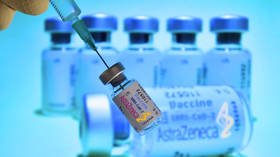Puzzling higher AstraZeneca vaccine efficacy for smaller dosage explained: It was reportedly tested on people only under 56

A seemingly strange phenomenon of a smaller dose of the Oxford-AstraZeneca Covid-19 vaccine being more effective than a bigger one is reportedly explained by it first being tested on a younger group.
On Monday, the pharmacological company announced that its AZD1222 vaccine for Covid-19, which is based on a common cold virus that causes infection in chimpanzees, has an efficacy of 70 percent. The number is average for two slightly different tests. One involved people, who received half a dose of the vaccine, followed by a full dose a month later, while the larger second group took full doses for both shots.
Counterintuitively, the first regimen showed 90 percent efficacy, compared to 62 percent for the second group of subjects.
Also on rt.com Over ONE BILLION doses of Russia’s Sputnik V vaccine against Covid-19 expected to be ready in 2021 as producer promises low pricesA larger dosage usually produces a stronger immune response, so the discrepancy made some experts wonder. Apparently, AstraZeneca omitted a key detail of their study that explains the results, Bloomberg reported on Tuesday citing Moncef Slaou, the head of the US Operation Warp Speed program.
The half-dose variant was tested on people aged between 18 and 55, while the full-dose test included elderly people. Younger people tend to have stronger responses to some kinds of vaccines. AstraZeneca earlier said their study has proven a strong response among the elderly. The difference in dosage was not by design but rather due to an error in the quantity of vaccine put into some vials, according to Slaou.
Coronavirus vaccine efficacyModerna: 95%Pfizer: 95%AstraZeneca: ~90% in one of two dosage levelsOutlook better than anyone could have reasonably hoped for a disease that didn’t exist in the human population a year ago.
— ian bremmer (@ianbremmer) November 23, 2020
The British-Swedish multinational is one of many vaccine producers racing to offer their products to nations worldwide. Many have published preliminary results of their studies, which indicate a better-than-expected efficacy, boosting public optimism about overcoming the Covid-19 pandemic. Publications of their full reports in peer-reviewed scientific journals are still in the pipeline, however.
Western frontrunners in the vaccine race expect fast-track approval by drug regulators, but AstraZeneca's snafu may come at a cost, some experts believe.
“I don't believe that the FDA will look positively at any trial where the dose, or the age cohorts, or any other variable were changed mid-trial, inadvertently or deliberately,” said Geoffrey Porges, an SVB Leerink analyst who predicted on Monday that the US Food and Drug Administration would not clear the vaccine.
US companies Moderna and Pfizer, along with its German partner BioNTech, are some of the other contenders for capturing the lucrative Western markets. Promising vaccine candidates are also under late-stage development in China and Russia, promising a high-octane clash for customers in the less-wealthy but more populous nations of Asia, Latin America, and Africa.
Also on rt.com Commercial interests & Russia/West geopolitical struggle combine to make race for Covid-19 vaccines a new battlegroundThe rival products are based on different platforms, have shown various levels of efficacy, and may have other caveats – like Pfizer/BioNTech’s strict requirement to maintain an extremely cold supply chain temperature during distribution of their vaccine. Both the Moderna and Pfizer vaccines use the new mRNA technology for immunization.
Russia’s pioneering ‘Sputnik V’ vaccine is based on a time-tested human adenovirus platform, which its creators say ensures the medicine’s safety and efficiency. The platform (along with a smaller price) may become a good selling point. A recent YouGov poll in countries like Mexico, the UAE, and Indonesia showed that the respondents who had preferences would reportedly rather choose the human virus vector than the chimpanzee variant.
Like this story? Share it with a friend!














